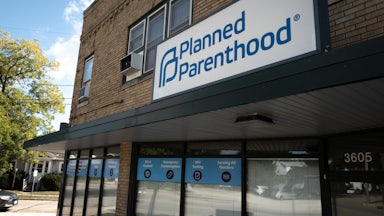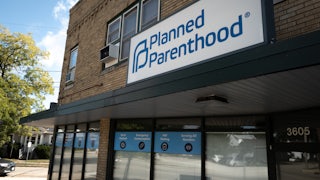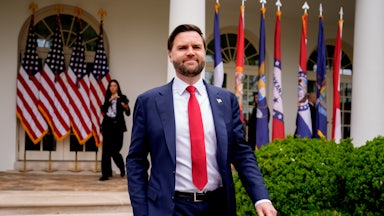The massive new Republican law narrowly passed by Congress this month could strip health care and nutrition benefits from millions of low-income Americans, even as some of the wealthiest households benefit from extended tax breaks. But the timeline and degree of these losses are somewhat uncertain: Some of the provisions most damaging to the social safety net will not be implemented until after the next congressional midterm elections, while others will be in effect as early as next year.
Some of the bill’s most significant cuts won’t kick in anytime soon. Major Medicaid funding changes that experts say will lead to states cutting their programs—such as new restrictions to the state provider tax and state-directed payments—will not go into effect until 2028. But new Medicaid work requirements will be implemented earlier: no later than December 31, 2026. New work requirements for the Supplemental Nutrition Assistance Program, formerly known as food stamps, may be implemented immediately; however, a provision to push more of the cost of SNAP onto states will not go into effect for most states until late 2027, with some exceptions.
Even aside from the parts of the law that will go into effect immediately, experts warn that states will begin making decisions that further restrict benefits ahead of the implementation of certain provisions in an effort to head off some of the incoming damage. In anticipation of restrictions to the Medicaid provider tax, which states use to help cover the cost of the program, health centers across the country are already bracing for closure. Rural hospitals in particular will be affected, and closures would harm those Americans who themselves are not Medicaid recipients but visit medical centers that would otherwise rely on these funds.
“These practices, these pediatric offices, these hospitals, will not be able to stay open with this reduced funding, and that’s going to create huge problems, both for the health of the Medicaid beneficiaries and the health of everyone in those communities,” said Johanna Lister, who works for the child health organization Zero to Three as the director of policy for HealthySteps, a pediatric care network, in a call with reporters. Although a medical center in Nebraska was the first to announce that it will close due to the impending Medicaid provisions, other rural hospitals may also turn to closure.
Experts also warn that some states will begin preemptively taking action to cut benefits ahead of time—many states have legislatures that meet on a biannual basis, and have constitutional mandates to balance their state budgets, meaning that they have a limited window to address the looming federal changes. It could also lead to states making decisions to cut other programs: Carolyn Vega, the associate director for policy analysis for the hunger relief organization Share Our Strength pointed to Texas Governor Greg Abbott’s decision to line-item veto $60 million in the state budget for a program providing free meals for low-income children last month, citing uncertainty about federal funding.
“We certainly don’t want to see more states going down that road of avoiding other really beneficial programs to fight hunger because of concern about how they’re going to fund SNAP,” said Vega.
Advocates say they will need to engage with lawmakers at a state and federal level to mitigate the damage. In the immediate future, said Vega, her organization wants to ensure that further cuts to programs like SNAP or the Supplemental Nutrition Program for Women, Infants and Children are not cut further in the annual appropriations process. That kind of advocacy involves “staying in touch with lawmakers and making sure that they continue to hear about how damaging these cuts were, and hear about the impact that it’s going to have on their constituents,” Vega said.
Given the delayed implementation of many provisions, some organizations and lobbyists are hoping that the measure will be either repealed or adjusted even before they have the chance to go into effect. Congress never implemented certain parts of the Affordable Care Act, such as a tax on “Cadillac” insurance companies.
As states try to figure out how to implement these provisions over the next few years, Lister said advocates can try to focus on “mitigating harm.” “If that means further being able to delay provisions, great. If that means creating more hurdles and more friction, great,” said Lister. “It’s really a ‘time will tell’ [situation], and I think states will have a big role to play, and I think and hope will have louder voices as they try to implement some of these that will help us in the national conversation.”
Ahead of the law’s passage, some Republicans expressed concerns about the provisions regarding Medicaid in particular, although this did not prevent the vast majority of GOP lawmakers from voting in favor; Senator Lisa Murkowski of Alaska notably voted in favor after securing an extension for the SNAP cost-sharing provisions to be implemented in her home state.
But certain GOP skepticism around the law remains. This week, Republican Senator Josh Hawley introduced a measure that would repeal the provisions restricting the Medicaid provider tax—even though Hawley himself voted for the massive Republican bill merely two weeks before.
Democrats are already hammering Republicans on the impending cuts to Medicaid, despite the time between the passage of the law and the implementation of the certain provisions. Leslie Dach, the chair of Protect Our Care, a progressive health care advocacy organization, argued that Hawley’s actions indicate an understanding of the political toxicity of cuts to social services.
“One vote in the U.S. Senate would’ve stopped this, and the Hawleys of the world talked big and did nothing. And now they know they’re in trouble, and they’re trying to cover their rears,” said Dach. “They have to understand that their constituents are going to hold them accountable for this.”
Dach also noted that the measure did not extend enhanced Affordable Care Act subsidies set to expire at the end of the year, which would lead to a spike in premiums, and in turn potentially resulting in millions of Americans becoming unable to afford health care. Along with the impending changes in Medicaid, this provides Democrats with more fuel for their attacks on the Republican bill. Although there are provisions in the law geared towards assisting families, some apply only to small slivers of the working population or do not reach the lowest-income Americans.
For Democrats and progressive organizations, communicating the effects of the law to voters is crucial to their advocacy. “Millions of people are going to lose their health care in the next few months, and millions more are going to have bills they can’t pay,” said Dach, citing the looming cliff in ACA subsidies. “So making sure that people understand why that’s happening and who’s responsible, I think, is the first step.”










